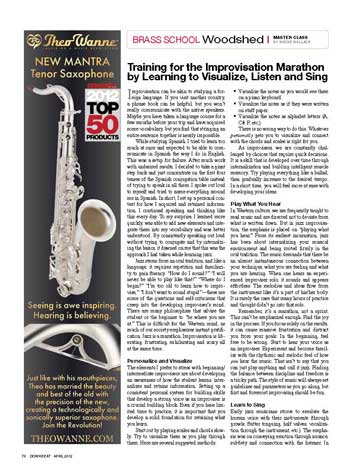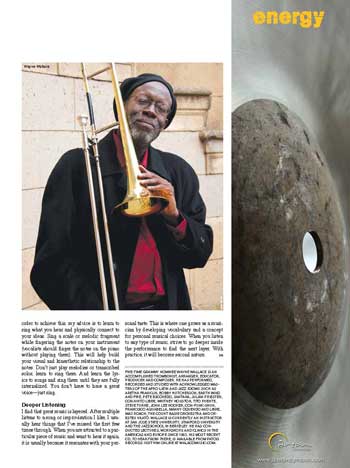 |
 |
Improvisation can be akin to studying a foreign language. If you visit another country, a phrase book can be helpful, but you won't really communicate with the native speakers. Maybe you have taken a language course for a few months before leaving and have acquired some vocabulary, but you find that stringing a sentence together is challenging. While studying Spanish, I tried to learn too much at once, and expected to be able to communicate in Spanish the way I do in English. This was a set up for failure. After much work with undesired results, I decided to take a giant step back and just concentrate on the first four tenses of the Spanish conjugation table instead of trying to speak in all them. I spoke out loud to myself and tried to name everything around me in Spanish. In short, I set up a personal context for how I acquired and retained information and continued speaking and thinking like this every day. To my surprise I quickly understood more, was able to add new elements and integrate them into my vocabulary and was better understood. By consistently speaking out loud without trying to conjugate and by internalizing the basics it dawned on me that this was the approach I had used in learning jazz.
Jazz stems from an oral tradition, and like a language, requires repetition and familiarity to gain fluency. "How do I sound?", "I will never be able to play like that!","Where do I begin?", "I'm too old to learn how to improvise", "I don't want to sound stupid"; these are some of the questions and self criticisms that creep into one's mind. There are many philosophies that ask the student or the beginner to "be where you are at". This is difficult for the western mind as much of our society emphasizes instant gratification. Jazz is a marathon. Improvisation is liberating, frustrating, exhilarating and scary all at the same time.
Setting up your own practice system
The elements I prefer to stress with beginning/intermediate improvisers are about developing the awareness of how the student learns, internalizes and retains information. Setting up a consistent personal system for building skills that develop a strong personal voice as an improviser is a crucial building block. Even if you have limited time to practice it is important that you build a solid foundation for retaining what you have learned and practiced
Start out by playing scales and chords slowly. Try to visualize the scales and chords. Several suggested methods:
a. Visualize the notes as you would see them on a piano
a. Visualize the notes as if they were on staff paper
c. Visualize the notes as alphabet letters (i.e: A C# F, etc.)
There is no wrong way to do this. Whatever personally gets you to visualize and connect with the chords and scales is right for you.
As improvisers we are constantly challenged by choices that require quick decisions. It is a skill that is developed over time through internalization and building intelligent muscle memory. Try playing everything like a ballad then gradually increase to the desired tempo. In a short time you will feel more at ease with developing your ideas.
What do I do with all this theory?
The majority of Western culture learns visually. We are taught to read music and directed not to deviate from what is written down. From its earliest incarnation, Jazz has been about internalizing your musical environment and being firmly rooted in the “oral tradition”. In Jazz improvisation the emphasis is placed on "playing what you hear". The music demands that there be an almost instantaneous connection between your technique, what you are feeling, and what you are hearing. When one hears an experienced improviser solo, it sounds and appears effortless. The melodies and ideas flow from the instrument like it's a part of his/her body. It is rarely the case that many hours of practice and thought didn't go into that solo. Remember– it's marathon, not a sprint!! This can't be emphasized enough. Find the joy in the process. If you focus solely on the results it can cause massive frustration and distract you from your goals. In the beginning, feel free to "be wrong". Start to hear "your voice" as an improviser. Experiment and become familiar with the rhythmic and melodic feel of how you hear the music. That isn't to say that you just play anything and call it jazz. Finding the balance between discipline and freedom is a tricky path. The style of music will always set guidelines and parameters as you go along, but first and foremost improvising should be fun!!!
Developing your voice. (Listen and learn to sing)
Early jazz musicians strove to emulate the human voice with their instruments. (Growls, flutter tonguing, half valves, vocalization through the instrument, etc.) The emphasis was on conveying emotion through nuance, subtlety, and connecting with the listener.
a. Learn to sing what you hear and physically connect to your ideas.
b. Sing a scale or melodic fragment while fingering the notes on your instrument (vocalists finger the notes on the piano without playing them.) This will help build your visual and kinesthetic relationship to the notes.
c. Don't just play melodies or transcribed solos, learn to sing them.
d. Learn the lyrics to songs and sing them
You don't have to have a great voice, just sing!!!
Long range goals (Hardcore listening)
I find that great music is layered. Maybe on the third listening we hear something that was missed on the first two times. When you are attracted to a particular piece of music and want to hear it again, it is usually because it resonates with your personal taste. This is where one grows as a musician developing vocabulary and a concept for personal musical choices. When you listen to any type of music, strive to go deeper inside the performance to find the next layer. It will become second nature.
Wayne Wallace


